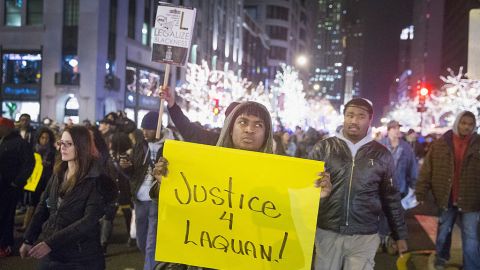Editorial: Misuse of police cameras
Police cameras are counterproductive when used to cover things up

La muerte generó protestas en Chicago. Crédito: Scott Olson | Getty
Protests in Chicago over the death of Laquan McDonald at the hands of Officer represent a community’s frustration in response to police actions. The fact that Van Dyke has been formally charged with murder is undoubtedly a positive development. The anger was sparked by the apparent intent of the authorities to cover up the event. What happened in this case is an example of why having cameras in patrol cars is insufficient without the will to use them as they should be used.
From the time an individual began to record the controversial police actions that were hidden in police reports, general trust in law enforcement agents has been crumbling. The appearance of cameras in patrol cars and on uniformed officers has the aim of recording police encounters with civilians for the protection of both the civilians and police against false claims.
The problem is that the rules for the use and especially for the public release of the videos are designed to protect the individual officer or the reputation of the police department. The case of Los Angeles, where this decision remains in the hands and at the discretion of the police chief, is commonplace.
This seems to have occurred in Chicago, where the video showing how an unthreatened Van Dyke fired on McDonald apparently would not have been made public without a judge’s order. It took 18 months for charges to be filed against the police officer. During this time, Van Dyke’s attorney said that McDonald was moving toward his client when none of that is seen on the video. This irregularity is coupled with the disappearance of the audio of conversations between officers that is automatically recorded when the siren I turned on and five other police videos from patrol cars.
What a contrast with the speed and efficiency demonstrated in publicly releasing videos or recordings that laud police work, as in the case on Friday at the Planned Parenthood clinic in Colorado.
Cameras used well are helpful for improving relations between communities and the police, but misused, as in Chicago, they become a trigger for reasonable public outrage.




